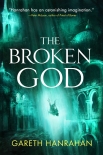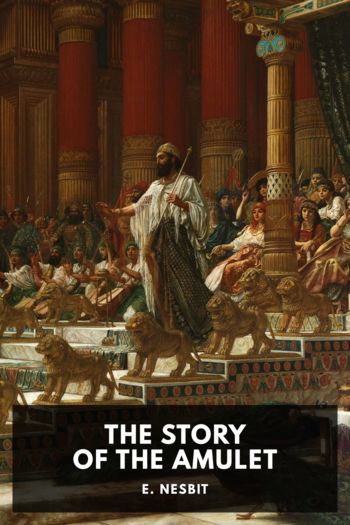The Broken God, Gareth Hanrahan [best historical biographies TXT] 📗

- Author: Gareth Hanrahan
Book online «The Broken God, Gareth Hanrahan [best historical biographies TXT] 📗». Author Gareth Hanrahan
There are jewels here, too. Cathedrals and palaces up on Holyhill. The sullen lump of the Parliament atop Castle Hill – ugly to look at, but valuable. And directly below, their destination – the great shining pearl of the New City. An unlikely beauty, a district of marble domes and spires, of boulevards that shimmer in the sun and alleyways like frost on the veins of a leaf.
Conjured, the Dentist told him, through some alchemical accident, a whole city springing up overnight.
Nearby, is another district, equally unnatural these days. The roofs of Ishmerian temples rise like shark’s fins through the purple gloom that hangs over what some call the Temple district, but in the staccato language of the Armistice is officially the Ishmeric Occupation Zone. Just like the New City is termed the Lyrixian Occupation Zone, and a swathe of the city from the edge of Holyhill to the north-eastern suburbs is the Haithi Occupation Zone. IOZ, LOZ, HOZ.
Abbreviations serve to sweep away the strangeness and the shame, neat boxes to categorise the unthinkable. The city escaped destruction and conquest only by inviting all its prospective conquerors in to share the prize. Like a woman, offering herself to the victors – take my body, do what you wish with me, only spare my children.
Or, in Guerdon’s case, spare my vital alchemical factories, spare my mansions and palaces. Spare my markets and my unfettered access to the arms trade, spare my wealth. The city’s found safety by balancing itself on a knife edge.
Is the city a pretty thing? Rasce considers the question. He’s seen many cities from the air, and many of them were glorious. He’s seen temples like blossoming flowers of crystal, stepped ziggurats of obsidian, golden-roofed longhouses where heroes feasted. He’s seen prettier places – but when the dragon was done with them, they were all ash. Guerdon’s an ugly place from the air. A great misshapen stone beast, rent by many wounds, that has crawled down to the shore to die – but even from this height he can see the thronged streets, the busy docks.
He can smell the money. Sense the power.
It is not a pretty thing, but that is not why the dragon desires it.
A rumble of disquiet runs through Great-Uncle’s titanic form as they pass the Temple district, and the clouds writhe in response. Cloud Mother’s monstrous offspring hide there. Rasce feels the dragon’s displeasure in his bones.
“We should fly over the HOZ,” says Rasce, “and dismay them.” A tube carries the sound of his voice to Great-Uncle’s earpiece. Otherwise, he’d have to shout at the top of his lungs to be heard from the dragon’s back.
“Not today,” rumbles Great-Uncle. “No provocations. We’ve had enough war. Now for business.”
Enough war. Rasce tugs at the unfamiliar badge on his flying armour – the sigil of the Lyrixian Army. Twenty years ago, they’d have been the ones shooting at Great-Uncle.
They descend towards one of the domed structures in the New City. Another dragon – Thyrus – patrols the air over the New City, banks towards Great-Uncle as they circle lower. The face of the Ghierdana rider on Thyrus’ back is hidden by her mask, but Rasce can imagine her scowl. He grins back at her.
A Lyrixian banner flutters in the breeze from the sea, then gets blown the other way, buffeted by the wind from Great-Uncle’s massive wings as the dragon lands on a plaza. Lyrixian soldiers guard the perimeter of this military enclave. Great-Uncle stalks through a hole blasted in the side of the dome, his movements suddenly clumsy and heavy now that he’s on the ground. Dragons are meant to soar.
Rasce dismounts. His own limbs are stiff and sore after the long flight. He, too, has become a creature of air and fire, not lumpen earth. He stretches, feeling the ache in his limbs. He’s young and strong, but only mortal. Many generations of his ancestors have ridden on Great-Uncle’s back, and they’re all gone now, while Great-Uncle remains.
Inside the dome, both dragon and rider shuck their military trappings. Lyrixian soldiers help Rasce out of his heavy breathing mask, strip off his flight armour. They remove, section by section, the armoured barding that protects Great-Uncle’s belly from anti-aircraft fire. They unhook the empty webbing that recently held alchemical bombs. The soldiers are nervous in the presence of the dragon; Great-Uncle puts up with their hesitant fumbling for as long as he can, but the dragon’s impatience wins out. He rips the last of the barding off, then stomps off towards the exit.
An officer – Major Estavo, Rasce recalls – hurries up, stammering something about a report on the bombing raid. A folder of documents clutched in his hand – damage reports, maybe, or proposed targets for the next sortie. He starts to salute, then catches himself. Rasce and the dragon are still criminals in the eyes of the Lyrixian state – it’s just that one of them is a criminal who can tear a warship in half or incinerate an army from above, which makes the dragons vital to the war effort. For the duration of the war, there’s a truce between the authorities and the Ghierdana families.
“Great Taras—” begins Estavo, addressing Great-Uncle by name.
“My nephew will deal with that,” rumbles Great-Uncle without stopping, and Estavo’s not stupid enough to stand in the





Comments (0)